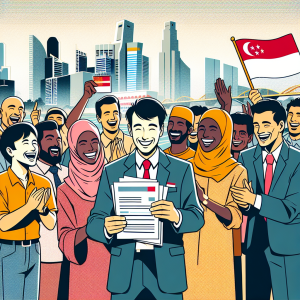The ongoing trade war between the United States and China has taken a new turn, with significant implications for Hong Kong and Singapore. As the U.S. government intensifies its tariff policies against China, Hong Kong finds itself caught in the crossfire, facing economic risks that could reverberate throughout the region. This shift in U.S. trade policy not only threatens Hong Kong’s status as a global financial hub but also poses challenges for Singapore, which is closely linked to the economic dynamics of the Asia-Pacific region.
Effective March 2025, the U.S. will raise tariffs on imports from both China and Hong Kong from 10% to 20%. This decision marks a significant change in the U.S. approach, as it now treats Hong Kong’s trade status as equivalent to that of mainland China. Historically, Hong Kong enjoyed a degree of economic autonomy under the “one country, two systems” framework, which allowed it to operate as a separate customs territory. However, the recent tariff policy undermines this status, raising concerns about the territory’s attractiveness to global investors.
The implications for Hong Kong are profound. The territory has long been viewed as a gateway for Chinese companies seeking to access international markets. With the U.S. now imposing the same tariffs on Hong Kong as it does on China, this vital role could be jeopardized. Investors may think twice about establishing operations in Hong Kong, fearing that the increased costs associated with tariffs will diminish their competitive edge. This could lead to a decline in foreign direct investment, which is crucial for the territory’s economic growth and stability.
Moreover, the U.S. tariff policy is part of a broader strategy aimed at addressing perceived trade imbalances and security risks associated with China’s economic practices. The U.S. government has expressed concerns about China’s use of Hong Kong as a conduit for circumventing trade restrictions, particularly in sensitive technology sectors. By extending tariffs to Hong Kong, the U.S. is not only targeting China’s economic strategies but also sending a clear message about its stance on human rights and democratic governance in the region.
The political backdrop to this economic shift is equally significant. Following Beijing’s imposition of national security laws in Hong Kong, which have curtailed political freedoms and autonomy, the U.S. has reassessed its approach to the territory. Historically, U.S. legislation, such as the U.S.-Hong Kong Policy Act, supported Hong Kong’s autonomy and promoted economic engagement based on democratic values. However, the recent tariff changes suggest a reevaluation of this stance, driven by national security concerns and the desire to hold China accountable for its actions in Hong Kong.
For Singapore, the repercussions of this trade war are equally concerning. As a major trading hub in Asia, Singapore is intricately linked to the economic fortunes of both China and the U.S. The increased tariffs could lead to a slowdown in trade flows, impacting Singapore’s export-driven economy. The city-state has positioned itself as a neutral ground for businesses operating in Asia, but the rising tensions between the U.S. and China may complicate this role, leading to uncertainty in investment decisions.
Furthermore, Singapore’s economic growth could be stunted if the regional supply chains that rely on both Chinese manufacturing and U.S. markets are disrupted. Companies may seek to relocate their operations to avoid tariffs, potentially leading to job losses and reduced economic activity in Singapore. The government will need to navigate these challenges carefully, balancing its strong economic ties with China while maintaining its relationship with the U.S.
As the situation evolves, there are calls for more open dialogue and congressional oversight in the U.S. to ensure that policies align with both strategic interests and support for democratic aspirations in Hong Kong. The complexities of balancing economic interests with geopolitical strategies and human rights considerations will be crucial in shaping future U.S.-China relations and the broader geopolitical landscape in the Asia-Pacific region.
In conclusion, the U.S. tariff war with China poses significant growth risks for both Hong Kong and Singapore. The intertwining of economic policies with geopolitical strategies highlights the challenges faced by these regions as they navigate a rapidly changing global landscape. As the implications of these tariffs unfold, the focus will be on how both territories adapt to maintain their roles as key players in the global economy while addressing the underlying political tensions that have emerged.





